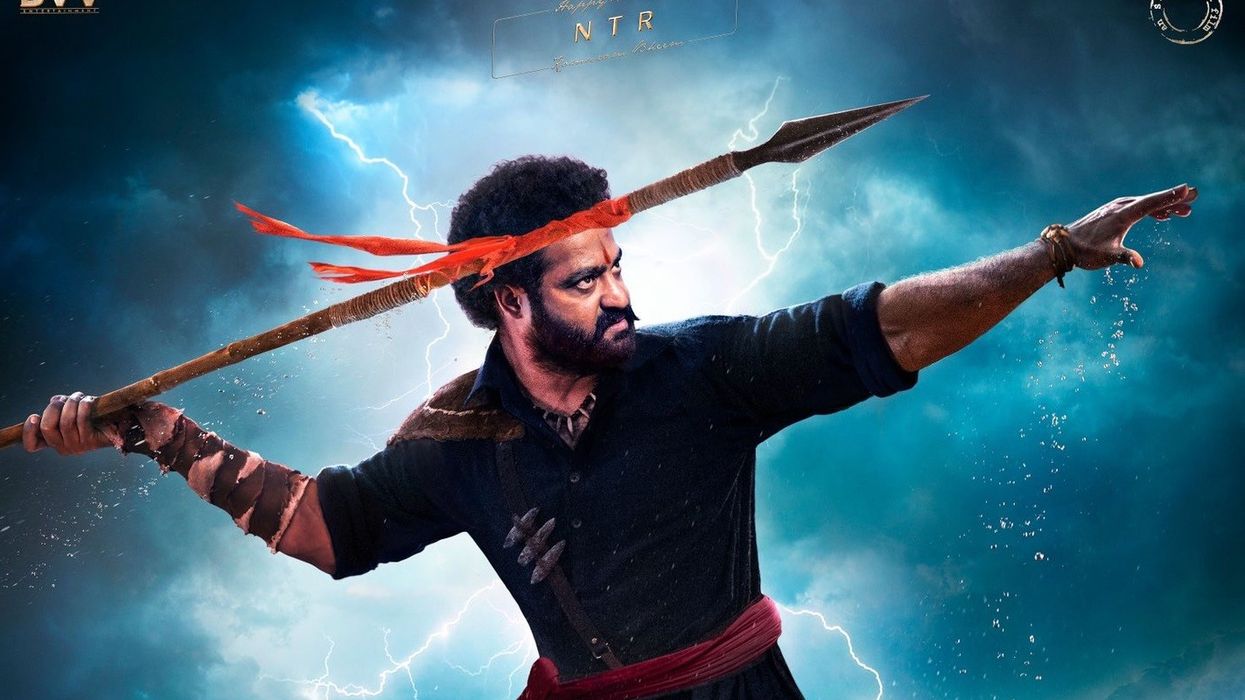The Telugu film, set in pre-independent India, fictionalises the lives of two freedom fighters –Alluri Sitarama Raju, played by Ram Charan and Komaram Bheem, essayed by Jr NTR.
Throughout the 200-plus day shooting schedule of RRR, Jr NTR felt the weight of filmmaker SS Rajamouli's ambition, which the actor says inspired him to give his best for the much-awaited action drama.
RRR, being Rajamouli's follow-up to the game-changing blockbuster Baahubali, sparked fan interest since its announcement in 2018.
In an interview with PTI, NT Rama Rao Jr, known among fans as Jr NTR, said he shot the film with the awareness that it was a "responsibility" to give his all.
"I felt the burden, constantly, every day. How can you survive if you don't have that pressure on you? You need to be reminded that you are part of someone's vision, who has believed and invested in you. Forget about the money, that is a different thing, but he has trusted you with his material so you have to do justice to that, there was responsibility," Jr NTR said.
The 38-year-old actor credited Rajamouli for his unwavering belief, which helped the teamwork towards the film the director had envisioned.
For instance, even if the crew was on a break, Rajamouli would constantly work to improve the project. The filmmaker would call up Jr NTR and discuss the nuances of a scene with him so that the actor never felt out of touch with his character.
"You need to have the right people around you and a fantastic director like Rajamouli to remind you what you are here for. The journey for 'RRR' demanded that kind of emotional and physical investment. When we were home and not shooting, we were given exercises so that we don't get away from the film. He would call me and discuss scenes, say that my character's expressions should have been exploited more in some places. So, I had to gather all the thoughts, recollect the moment and be back to the scene. I had to be completely involved, immersed in the film," he added.
The scale of RRR is bigger than that of the actor's previous three collaborations with the 48-year-old director. The duo first worked together in the 2001 action film Student No 1, followed by Simhadri in 2003, and the 2007 fantasy action-comedy Yamadonga.
Jr NTR said Rajamouli is perhaps one of the few directors in the country, who can truly challenge an actor. With Komaram Bheem, a revolutionary who the actor was well versed with, Rajamouli added more layers and presented a novel character.
RRR attempts to fill the historical gap where the two freedom fighters, who belonged to the same era, left home with no record of what they did for four years before they came back and started to fight for the people. Once you become a Rajamouli character, you want to give your 100 per cent. You just don't want to settle at 50 percent or 80. You want him to get him from his seat, when he is watching you on the monitor, and tell you an excited 'Okay!'
"You want to hear that. Working with him is a challenge but I have always loved that. The beauty is that he has also constantly challenged himself as a filmmaker. He has earned that respect. As an actor that's what you want, to get a director who can push you, make you feel vulnerable at times," he added.
The film is also being hailed for pulling a casting coup with Jr NTR and Charan together in a project. The actor said he is aware that the genre of multi-starrer films has virtually faded, but hoped RRR will ignite the trend considering how more pan India films are being made today. RRR also stars Alia Bhatt and Ajay Devgn.
"Somewhere, our industries have stopped making multi starrers films. With RRR, a multi-starrer film in Telugu is coming after, probably, 30 years. I think Karan Arjun was the last Hindi film where two massive stars, equal in stature, came together for a film. Stars having equal persona, talent, and following. Why did it stop, I don't have an answer. But maybe it will start again. There is now going to be a lot of cultural exchange, with crossover, multi-starrer films. It is good to call ourselves one big Indian film industry. I feel so proud that I, as an actor, am a part of this era. An era which was earlier closed, now it is opening and combining all of us together. I truly feel blessed," he added.
RRR is set to arrive in cinema halls on January 7. The film will be released in Hindi, Tamil, Malayalam, and Kannada as well.




